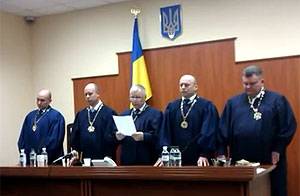Looking after Ukraine’s Judges

High Administrative Court issues its judgement regarding Vlasenko’s mandate on 6 March 2013 (photo: Ukrainska Pravda)
The timing was unreal. On the same day that five judges of the High Administrative Court stripped an opposition MP of his parliamentary mandate and immunity from prosecution, the government reported plans to improve security for judges and their families.
The draft bill drawn up by the Justice Ministry proposes amendments to legislation aimed at strengthening state protection of judges and their close relatives.
The bill would, for example, extend the list of people in the Law on the Judicial System and Status of Judges eligible for special security measures, with close family members and relatives being added.
The bill also proposes a ban on divulging any information about a judge by the authorities, businesses, institutions, organizations, and individuals who learned the information through their official activities. What information, one wonders, would be excluded? Journalists carrying out investigations as part of their professional work might not be covered by the ban, but some of their sources most certainly would. This would surely provide a carte blanche to public officials who could justify refusing any access to information about judges’ income declarations, etc.
The measures to be heightened for judges’ security, at the taxpayers’ expense are in principle justified. Judges in any country may face danger directly linked with their professional activities.
The problem, perhaps highlighted by the timing, is which judges are to be so protected, and why no information is to be divulged. The ruling passed on 6 March by 5 judges of the High Administrative Court has been met with dismay and outrage by all European and US observers, and almost certainly puts an end to any hopes that Ukraine will be able to sign the EU-Ukraine Association Agreement. Presiding Judge Zaitsev was careful to stress that the ruling is final and not subject to appeal. This is despite the obvious political motivation behind the move to strip imprisoned former Prime Minister Yulia Tymoshenko’s defender of his parliamentary mandate.
Judges of the High Administrative Court have now ruled to strip four MPs of their mandate which had been confirmed by the Central Election Commission. Grave doubts about the constitutionality of this are unavoidable, but most unlikely to be confirmed by the Constitutional Court which has, over the last three years, been most obliging in providing rulings that suit those in power.
At least one judge involved in the trials of opposition leaders has been given increased security. Rodion Kireyev, who 18 months ago sentenced Yulia Tymoshenko to 7 years imprisonment over the 2009 gas accords with Russia, is reported to have his own guard. He has also just been promoted to the post of Acting Deputy Head of the Pechersky District Court in Kyiv. For a person whose involvement in the trial of Yulia Tymoshenko was criticized by the Venice Commission because he has not yet finished his 5 year temporary tenure, this is quite some jump.
How much of this information will become known to the public after the above-mentioned draft law is passed is a moot question. Most officials are likely to err on the side of caution and reveal no information at all.
The public would be left aware that certain judges – like Serhiy Vovk, Anna Medushevska and Oksana Tsarevych – are taking part in a suspiciously large number of “political trials” given the random case selection supposedly in force at the Pechersky District Court. They would have much less success learning about the fate of the criminal charges first laid then revoked with respect to Judge Vovk.
And, as mentioned, they could probably whistle for information about changes to the judges’ financial circumstances which, at least in the case of Judge Kireyev, are reported to have already taken place.
And all out of considerations of security…





